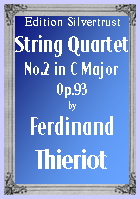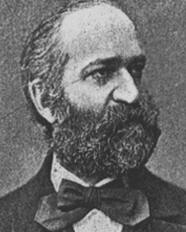Presents
Ferdinand Thieriot
 |
 |
Soundbites courtesy of Steve Jones |
String Quartet No.2 in C Major, Op.93
Ferdinand Thieriot's String Quartet No.2 in C Major was completed in 1911 and published the following year. Though it was given the number 2, it was one of the last, if not the last of the thirteen string quartets he wrote, all but one other never receiving publication during his lifetime. In four movements, the first is simply marked Tempo moderato. The music is genial and relaxed and though the quartet bears the dedication 'To the memory of Joseph Haydn' there is nothing which brings that composer to mind. Rather, the tonality recalls Schumann and Mendelssohn. The second movement is marked Tempo di Menuett. Charming and certainly a bit old fashioned for 1911. The third movement, Choral-Adagio, is somber and reflective as the title suggests. The bright and lively finale, Allegro non tanto, sports a main theme with an off-beat, syncopated rhythm.
Ferdinand Thieriot (1838-1919), five years younger than Brahms, was not only born in Hamburg, but also studied with the same teacher, Eduard Marxein. The two knew each other from their Hamburg days and remained on friendly terms. After Hamburg, Thieriot finished his studies in Munich with Joseph Rheinberger and then moved to Vienna where his friend Brahms was instrumental in helping him obtain the position of Styrian Music Director in the provincial capital of Graz where he worked between 1870-85. Later, Thieriot held important positions in Leipzig and Hamburg where he remained from 1902 until his death. For the most part, Thieriot, like Brahms, remained true to the classical traditions which preceded him and took Beethoven, Schubert, Mendelssohn and Schumann as his models. Only toward the end of his life did he his work show some of the influence of the "New German Music" of Wagner and Liszt. Thieriot wrote a great deal of chamber music, most of it of very high quality. Wilhelm Altmann, one of the most influential and perceptive chamber music critics of all time, writing of Thieriot's chamber music, states: "Thieriot's chamber music is without exception noble and pure. He writes with perfect comand of form and expression." This was written nearly 20 years after Thieriot's death. During his lifetime, critics uniformly praised his chamber music works for their high quality, for his gift of melody and the effectiveness of his writing. And yet, all of this praise turned out to be ephermeral as his music quickly disappeared from the concert stage and his fine music was unjustly forgotten along with that of so many other fine composers from the Romantic era.
This quartet can be warmly recommended to amateurs as it presents no technical difficulties, is tuneful, with good part-writing for all.
Parts: $24.95